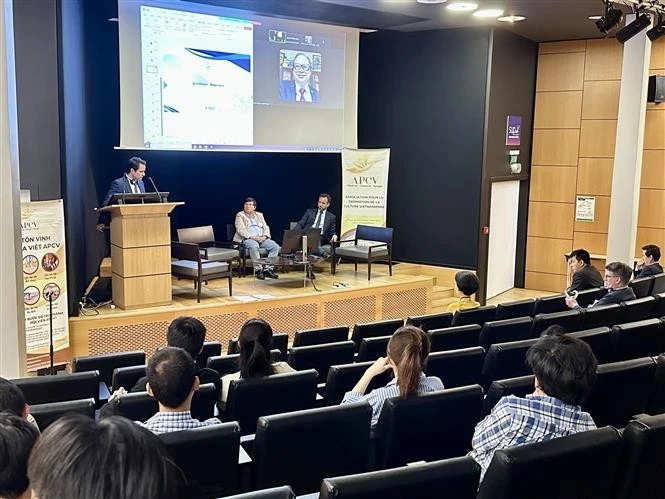Digital Health and AI: Navigating the Future of Healthcare
As the sun dipped below the Paris skyline on June 13, a group of distinguished experts gathered in a sleek conference hall, illuminated by screens displaying cutting-edge technology and vibrant health data visualizations. This international conference on digital and AI strategies in healthcare was not merely a meeting; it was a harbinger of the future, bringing together thought leaders from France, the UK, and Vietnam to share groundbreaking advancements and explore international collaboration.
The Shift to Smart Healthcare
The forum illuminated a significant transition in healthcare, moving from traditional models to “smart healthcare,” where data-driven decision-making is essential for diagnosis, treatment, and disease prevention. The attendees recognized that algorithms could now unveil insights previously obscured, promising to revolutionize patient care worldwide.
Bridging Technology and Mental Health
Dr. Tran Van Xuan, Chairman of Brain-Life, a UK-based organization, captivated the audience with his insights into the integration of artificial intelligence with Brain–Computer Interface (BCI) technology. “We are on the brink of a revolution in mental health,” he declared. “AI can detect early signs of mental issues, enhancing not just individual productivity, but also shaping educational environments.”
This strategy could have profound implications for healthcare. According to a study by the World Health Organization, mental health disorders account for 13% of the global burden of disease, demonstrating the urgent need for innovative solutions.
Vietnam’s Digital Transformation in Medical Education
Assoc. Prof. Dr. Nguyen Viet Nhung from Vietnam National University (VNU) presented on Vietnam’s ambitious strategy. As the country aims to be a developed nation by 2045, the integration of AI and digital tools into medical training is a priority. Yet, a survey at VNU revealed a paradox: while 68% of medical lecturers believe tools like ChatGPT enhance teaching quality, 72% felt unconfident using them. “This underscores an urgent need for systematic training,” Dr. Nhung noted, emphasizing the gap between belief and capability.
- 68% of medical lecturers see AI tools enhancing teaching quality.
- 72% report feeling unconfident in utilizing these tools.
- Vietnam prioritizes digital health education in alignment with national developmental goals.
Implementing Digital Solutions in Clinical Settings
From a clinical perspective, Alexandre Drezet, Director of Innovation at Foch Hospital in France, highlighted practical implementations of digital technologies in healthcare. “Telemedicine has expanded access, with over 5,900 online consultations and 6,000 remote monitoring cases in our facility alone,” he stated. Drezet also discussed the digital hospital’s “AI Committee,” an innovative team structure designed to ensure transparency in AI deployment across various functions.
Transforming Pharmaceutical Development
In the realm of drug discovery, Prof. Philippe Moingeon, a former researcher at Harvard Medical School, showcased how AI is reshaping pharmaceutical development. “We have reduced development time from 5-7 years to just two,” he explained. “Currently, 120 to 150 AI-designed drugs are undergoing clinical trials, and early indications are promising.” According to recent findings published in the journal *Nature*, AI-driven methodologies are projected to enhance efficacy in drug delivery systems by over 30%.
Addressing Challenges and Barriers
Despite substantial advantages, significant barriers remain. Dr. Xuan lamented the high costs associated with BCI devices, which currently sit at 1.5 times the average monthly salary in Vietnam. However, he expressed optimism that local production could drive prices down to around 100 USD, making this promising technology accessible to the larger population.
Data privacy and cybersecurity emerged as critical concerns during the discussions. “Comprehensive information strategies and tangible demonstrations of effectiveness are necessary to overcome these challenges,” Dr. Xuan argued, advocating for a structured approach to data governance.
The Complementary Strengths of France and Vietnam
The partnership between France and Vietnam in digital health is viewed as highly synergistic. France offers advanced technologies and established expertise in medical research, while Vietnam boasts a youthful, mobile-first population, making it an ideal landscape for adopting low-cost mental health innovations.
Dr. Xuan proposed a compelling collaborative model: “Make in Vietnam – European Quality – Worldwide Market.” This vision aims to leverage Vietnam’s affordability and talent alongside Europe’s technological and commercialization capabilities, resulting in mutually beneficial outcomes for both nations.
Shifting to a Human-Centric Paradigm
A key discussion point throughout the conference was the transition from Industry 4.0, characterized by automation and efficiency, to Industry 5.0, which emphasizes human-centric and resilience-oriented approaches. This shift is particularly salient in healthcare, where the integration of technology must fundamentally enhance human wellbeing rather than detract from it.
Policy Recommendations for a Sustainable Future
Experts unanimously proposed several policy recommendations aimed at fostering an open innovation ecosystem in neurotechnology:
- Funding for research and development in mental health technology.
- Encouraging public-private partnerships in digital health initiatives.
- Supporting pilot programs for BCI technologies.
- Integrating focus-enhancing technologies into national digital health strategies.
The consensus was clear: AI and digital technologies in healthcare are not futuristic concepts; they have already begun reshaping medical landscapes worldwide. With the France-Vietnam partnership leading the charge, both nations are not only on the brink of significant economic gains but are also honing their capabilities to address urgent global health challenges.
As the conference concluded, it became evident that the synergy between France’s technological prowess and Vietnam’s youthful market could place both nations at the forefront of the digital healthcare revolution. In an era marked by rapid change, the collaboration sparked during this gathering signals a pioneering journey into the future of healthcare—one that could redefine lives across the globe.
Source: en.vietnamplus.vn


